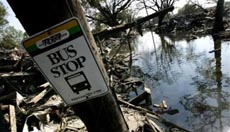The Pentagon takes efforts to combat hurricanes and floods
According to the U.S. legislation, armed forces may not be involved in hostilities inside the country
U.S. President Bush is going to send a bill to the Congress in order to allow the U.S. armed forces to handle severe natural disasters in the U.S. The bill would also allow the military to take charge of such operations. The government says the U.S. Department of Homeland Security's response to the consequences of Hurricane Katrina was unsatisfactory. In other words, Defense Secretary Donald Rumsfeld has finally won a longstanding game of brinkmanship played against Homeland Security Secretary Michael Chertoff. 
Last Sunday U.S. President Bush took part in a meeting of the joint operative control center Rita that was set up to cope with the disaster. All participants of the meeting noticed that the president looked weary and stressed out. The president was informed about the reasons behind poor effectiveness of rescue efforts during Katrina and what steps should be taken to avoid the problems in the future. Maj. Gen. John White told the president: “We did not see any work being done in New Orleans, we saw panic in the train on fire. We could have done something if we had had a clear plan with duties distributed and a single command structure which is the most important thing.” The President Bush replied: “That is exactly what I wanted to hear. I am going to Washington to ensure that a more clear-cut control system is in place in case of large-scale natural disasters.” The president promised to send a bill to the Congress that would allow the U.S. military to fight natural disasters and also “take command of rescue operations.”
Ugly faces of diarchy
According to the U.S. legislation, armed forces may not be involved in hostilities inside the country unless there is martial law imposed. Until recently the 1878 law “Posse Comitatus Act” (“On the Use of Force”) has been considered an effective protection against the threat of coup d'etat in the U.S. However, this summer American politicians started discussing possibilities of full-scale use of the military force for dealing with consequences of large terrorist attacks involving the use of weapons of mass destruction. Everybody could appreciate that the authorities would have to use the army. The question was: who will be in charge. The military hoped that they would take full command of the use of armed forces on U.S. soil. However, on August 8th, the head of U.S. Department of Homeland Security went on the air on CNN and categorically demanded that his department be in charge of all rescue and law enforcement agencies including military units reporting to the Pentagon. “The department of homeland security has been directly authorized by the president to coordinate all response actions in case of a terrorist attack on the United States,” said Mr. Chertoff. The military did not retaliate with any statement that time. Apparently relieved at the lack of action on the part of the military, Mr. Chertoff switched to integrating the Federal Emergency Management Agency (FEMA) into his department. Rather unfortunate for the residents of the American South, Hurricane Katrina did not wait for the end of transferal of duties from one ministry to another. “Panic in the train on fire” was largely due to misunderstanding and confusion on the grass-roots level of the rescue services management. The rescue team leaders just could not understand who was in charge of coordination of the rescue effort, whether it was the Department of Homeland Security or FEMA. The bureaucrats at both ministries were constantly shifting responsibility to and fro.
Chertoff should be held responsible
The joint operative control center Rita is already under full command of the officers of U.S. Army Northern Command Center. It is hard to say whether the military could have acted more efficiently in a situation similar to hurricane Katrina. Hurricane Rita was much less devastating. U.S. press is unanimous that the “Department of Homeland Security should forget about its ambitions now and forever.” Michael Chertoff is still in office as FEMA's director tendered his resignation. “I resign for the benefit of the agency and the president,” he was quoted as saying.
However, Mr. Chertoff will soon report on issues pertaining to the government's response to Katrina in U.S. Congress Commission for Homeland Security and State Affairs. It will certainly be a tough time for Mr. Chertoff. “The Department of Homeland Security was set up shortly after the 9/11 attacks. It had four years and billions of dollars from the federal budget to improve the government's readiness to respond adequately to emergency situations. The response could have been more coordinated so we could have avoided all that chaos on all levels,” said Susan Collins, chairwoman of the commission, in her interview with CNN.
Ap photo
Subscribe to Pravda.Ru Telegram channel, Facebook, RSS!




